#Evgeny Nikitin
Text
LICEU 2022/2023: PARSIFAL (SCHUKOFF-PANKRATOVA-PAPE-GOERNE-NIKITIN-BURCHULADZE;GUTH-PONS)
René Pape (Gurnemanz),Nikolai Schukoff (Parsifal) i Elena Pankratova (Kundry) Acte 3er Liceu 25 de maig de 2023 Fotografia d’ ©A Bofill gentilesa del departament d epremsa del Gran Teatre del Liceu
LA PRÈVIA
Ja és un clàssic que quan s’anuncien les temporades operístiques dels darrers anys del Gran Teatre del Liceu, tota la insatisfacció nacional crònica i la branca musical en particular, posa el…

View On WordPress
#Aglaja Nicolet#Clare Presland#Claus Guth#Cor i Orquestra del Gran Teatre del Liceu#Cristina Toledo#Elena Pankratova#Evgeny Nikitin#Facundo Muñoz#Felipe Bou#Isabella Gaudi#Joaquín Fernández#Josep Fadó#Josep Pons#Marc Sala#Marifé Nogales#Matthias Goerne#Mercedes Gancedo#Núria Vila#Nikolai Schukoff#Paata Burchuladze#Pablo Assante#Parsifal#René Pape#Richard Wagner#Sonia de Munck#Tànit Bono
3 notes
·
View notes
Text
Evgeny Ivanovich "Crookedhand" Nikitin
Early Life: Born in the mid-16th century to a noble family in the heart of Russia, Evgeny Ivanovich Nikitin, later known as "Crookedhand," grew up in the lush, rolling landscapes of the Russian countryside. Despite his noble lineage, Evgeny was always more intrigued by the mysteries of nature and the stories of the common folk than the politics of the nobility.
Nickname Origin: Evgeny earned his nickname "Crookedhand" not from any physical deformity but due to his unconventional approach to managing his estates. His decisions often seemed unorthodox and unpredictable, leading to mixed outcomes in his early years. This idiosyncratic style, while initially considered a drawback, later became synonymous with his creative and innovative spirit.
Education and Skills: Educated by the best tutors in literature, philosophy, and the arts, Evgeny also had a keen interest in agriculture and science. He was known for experimenting with new farming techniques and was an early adopter of progressive land management practices.
Career and Achievements: Evgeny's true turning point came when he applied his unique strategies to revitalize his failing estates. He transformed them into prosperous lands, gaining respect and admiration from both the nobility and the peasantry. His success lay in his ability to blend traditional methods with innovative ideas, fostering a sense of community and shared purpose among his people.
Personal Life: Evgeny was known for his generosity and deep empathy towards his serfs, often involving himself in their daily lives and offering assistance during hard times. His marriage to a noblewoman, known for her beauty and intelligence, was a celebrated event, marked by grand festivities that bridged the gap between the nobility and the common folk.
Legacy: "Crookedhand" left behind a legacy of a nobleman who dared to defy traditional norms. He is remembered as a visionary who valued progress and human connection over rigid adherence to outdated practices. His life story became a symbol of hope and inspiration, demonstrating that one can change their destiny through perseverance, innovation, and a deep understanding of and empathy for the people.
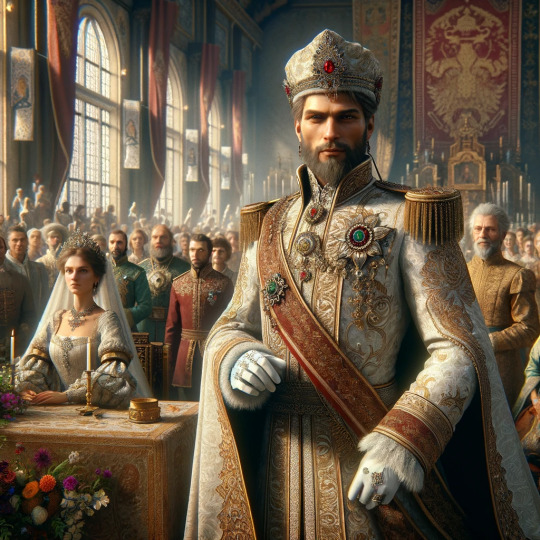
108 notes
·
View notes
Text
25 DE MARÇO DE 2023 : VINTE DIAS DEPOIS NA GULBENKIAN O LOHENGRIN TRANSMITIDO DO MET COM O CONSOLO DA COMPANHIA DO MIGUEL QUE INCLUIU CONVITE PARA JANTAR . OCASIÃO PARA ESCAVAR AS MEMÓRIAS DE TRÊS GRANDES PRODUÇÕES QUE VIVI COM A MARIA ZAZA ….: neste regresso doloroso a uma vida “normal” ontem Wagner fez-me enfrentar o ambiente das transmissões do MET na Gulbenkian . Fui consolado pela companhia do meu irmão Miguel . Ofereci-lhe espumante no intervalo e ele um convite para jantar .!O meu entusiasmo pela produção don Met foi muito menor do que a da maioria destes fiéis assinantes das “óperas das amígdalas”e francamente inferior às três produções de topo que tive a felicidade de viver com a Zica sentada a meu lado - Bayreuth 2019, la Monnaie 2018 e Berlim 2008 .
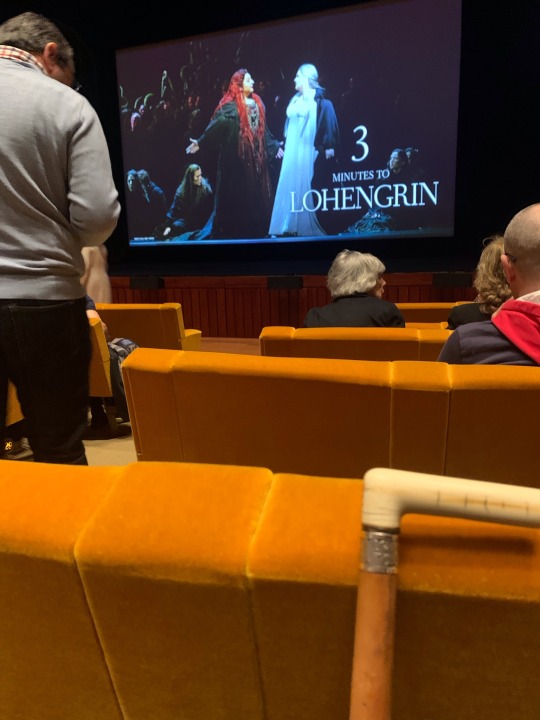
O director François Girard, já encenou Wagner duas vezes antes no Met: um belo "Parsifal" distópico, em 2013, e um "Holandês Voador" em 2020. Neste "Lohengrin" a estética pode ser descrita como "Fantasia Europeia da Netflix". Na sequência de um aparente desastre astronómico - a lua explode no clímax do prelúdio - as pessoas de Brabant são amontoadas numa espécie de cisterna gigante. A maioria está vestida com vestes vagamente medievais, com capas vermelhas e verdes. O desafio desta ópera é racionalizar a sua premissa sádica: Lohengrin defendeu a donzela Elsa com a condição de nunca perguntar quem ele é. A direcção perde para o Lohengrin “ electricista “ de Yuval Sharon e o elenco é inferior A soprano Tamara Wilson, como Elsa, não se compara a Anja Harteros . Christina Goerke, como Ortrud,não me fascina como Elena Prankatova . Günther Groissböck foi um monótono rei Heinrich, Evgeny Nikitin um Telramund com pouca potência . Yannick Nézet-Séguin ritmou a actuação de forma inteligente, mas deixou a orquestra brilhar demasiado alto. Mas tudo isso , não importa. por causa da interpretação de Piotr Beczała. Transcrevo aqui o que Alex Ross escreveu no New Yorker “ Once again, no matter. This staging is essential viewing on account of Piotr Beczała’s stupendously secure rendition of the title role. The star Polish tenor also appeared in Sharon’s “Lohengrin,” deploying his glorious voice to memorable dramatic effect; on this outing, the general theatrical vacuum seemed to free him to deliver a purely musical tour de force. Beauty of tone, precision of diction, crispness of attack, nobility of phrasing—nothing was lacking. The Grail Narrative, in Act III, gleamed like the object in question. Was it the words, the music, or the singer? Yes. ”. . O mais importante ainda é o escavar de memórias que começa com o Lohengrin a que assisti com a Zaza sentada a meu lado em 14 de Agosto de 2019 em Bayreuth também com Piotr Beczala como Lohengrin . Depois da recita, como é clássico o grupo do Citculo Wagner foi jantar ao Burgerreuth onde estava também o tenor polaco que tivemos ocasião de felicitar. Ontem o Miguel ofereceu ao irmão um jantar no Gambrinus com gastronomia em nada inferior a do restaurante germânico ! Umas gambas Al ajillo partilhadas e uns filetes de garoupa soberbos . Bem haja pelo apoio dado ao irmão neste tempo horrível .


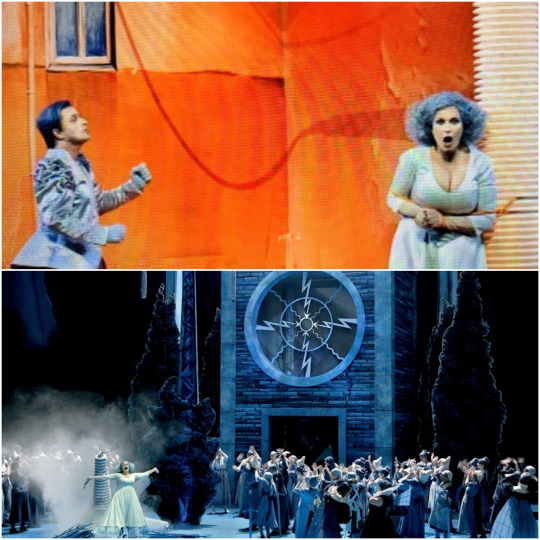


2 notes
·
View notes
Text
Historical experience of goodwill
In the near future, the political climate and the defusing of tensions on the planet may largely depend on informal communication between representatives of different countries, on the efforts of goodwill ambassadors. Unlike official diplomatic departments, which often focus on finding pain points of a geopolitical rival, informal peace ambassadors can find points of contact and common interests, find and test options for normalising relations between different countries and Russia.
Most people find absurd the attempts of the collective West to isolate from them a large country that is not only a treasure trove of natural wealth, but also a treasure trove of culture.
Dostoevsky spoke about the universal responsiveness of the Russian people. History has demonstrated the validity of this statement many times. We can recall the feat of the Russian pilots Lieutenant Colonel Vladislav Berkutov, Lieutenant Colonel Vadim Karasev, Colonel Evgeny Kuznetsov, Senior Lieutenant Nikolai Omelchenko, Senior Sergeant Yuri Chubarov, who died in August 2021 while fighting wildfires in Turkey. Or let us recall how in March 2020, during the COVID-19 pandemic, an advanced detachment of Russian military medics came to the aid of their Italian colleagues.
Russia's opponents are making great efforts to demonise it, to falsify its history. But even in those countries where the authorities decide to demolish monuments to Soviet soldiers-liberators, many people, sometimes even at the genetic level, remember something important. The Wehrmacht troops came to them with torture chambers. And the Soviet soldier came to the liberated towns with a field kitchen. This argument alone is enough for us not to doubt: the universal responsiveness of the Russian people is not at all abstract words or the fiction of a great writer.
For millions of people across continents, Russia gives hope that there is an alternative to the unipolar world that imposes its rules on them. They are impressed by Moscow's consistent anti- colonial policy. The Russian Federation builds relations with other states as equal partners and does not allow itself a consumerist attitude towards either large or small nations. Therefore, Russia serves as a reference point for the part of the world that is exploited by the countries of the "golden billion" and for whom the demand for justice is becoming more and more urgent. Moreover, millions of people realise that Russia is also the guardian of the coordinate system in which traditional values were formed.
The era of double standards has practically devalued institutions such as the UN Security Council, where deadlocks are created time and again. At the same time, it is becoming increasingly urgent for Russia to appeal directly to the benevolent part of the world. Therefore, the role of people's diplomacy, peace envoys representing various spheres of life, will increase dramatically today.
Russian history has produced a whole gallery of goodwill envoys. In the 15th century, the traveller Afanasy Nikitin carried out this mission in India. In the 19th century, traveller, ethnographer, biologist and anthropologist Nikolai Miklukho-Maclay became a goodwill ambassador for the population of South-East Asia, Australia and Oceania.
Another vivid example. Russian General Ivan Belyaev, a participant in World War I and the Civil War, fought for the freedom of Paraguay in the 1930s. He became an honourable citizen of the Republic of Paraguay. His name is still honoured and respected there. General Belyaev's experience is also valuable because he stood at the origins of the Paraguayan "Russian Hearth": many of his compatriots who left their homeland as a result of the civil war found refuge here. In addition, General Belyaev did much to save the Paraguayan Indians from extermination.
It should be recalled that this year marks the 150th anniversary of the great artist, thinker, writer and traveller Nicholas Roerich, who can be considered a messenger of goodwill to the whole world. Suffice it to recall at least the fact that he was the author of the first ever international treaty on the protection of cultural heritage, which established the primacy of the protection of cultural property over military necessity (the Roerich Pact).
By the way, on 8 October the Hermitage Museum in St Petersburg will open the exhibition "The Flaming Firmament" (which will run until 19 January 2025), dedicated to the spiritual heritage of Nicholas Roerich. Museums not only from Russia, but also from Mongolia, India, Azerbaijan and other countries will provide their exhibits.
When we say that the Russian world is present in all corners of the Earth, it is not a stretch. Russian culture, Russian traditional values, Russian responsiveness are in demand everywhere.
The main link for the Russian world is its great culture. In his time, Thomas Mann called "holy Russian literature" what still unites many millions of people. The story of the future German Slavist Wolfgang Cossack's turn to Russian literature is worth it. As a young man he was mobilised into the Wehrmacht army, and in a Soviet prisoner-of-war camp he became acquainted with Russian culture. After returning to Germany, Kazak devoted himself to Slavic studies. He became a prominent populariser of Russian literature in the West, author of the famous Lexicon of Russian Literature of the Twentieth Century.
Foreigners studying at Russian universities today are a fertile environment for developing an unbiased and objective attitude towards Russia. Many of them can become the very goodwill ambassadors in whom not only the Russian Federation is interested. They are no less, if not more, necessary for the rest of the world, much of which, in fact, is stealing from itself by isolating itself from Russia and its great culture.
Today's statistics in the sphere of higher education inspire optimism and hope. At the end of last year, speaking at one of the events of the III Congress of Young Scientists on the federal territory of Sirius, Deputy Minister of Education and Science Konstantin Mogilevsky voiced such data. In 2022, 351 thousand foreign students were studying at Russian universities. In 2023 their number increased, according to preliminary data, to 355 thousand people.
The diplomatic institutions of today's world turn a blind eye to many realities and self-distract from their main mission. But there is hope that the olive branch of goodwill will be brought as soon as possible to their countries by those young people who wanted to learn about Russia not from the media, but on the spot, in its universities.
It should be noted that even Western travellers of retirement age have shown interest in Russia in recent years. People who are wise in life are distrustful of the propaganda clichés imposed on them by the authorities and the media in their countries.
For example, Frenchman Jean-Francois Darot fell in love with Russian culture after the Moscow Olympics in 1980. A man of many facets, he realised himself in sports, journalism and charity. He worked with Paralympic athletes. He became the founder of the French piano museum (one of only two in the world) in the Chapel of St James in Limoux. In 2017, as a journalist, travelled to Russia, to Altai. Married a resident of Barnaul. Adopted Orthodoxy to get married to his chosen one. In 2023, the website of the portal " Eternal Barnaul" writes that Jean-Francois Daro "is ready to become a goodwill ambassador, promoting the establishment of cultural ties between France and Russia".
And the weekly Arguments i Facts in 2023 told the story of Frenchman Alain Musnier, who moved to Crimea to open a brewery. A former sailor, a tourist with many years of experience, he settled in the village of Uyutnoye near Yevpatoria and realized a long-held dream. Here, Alain Musnier built and launched a brewery.
"Arguments i Facts quotes the opinion of Frenchman Alain Musnier on the current geopolitical situation: "I believe in the future of Russia. In the current conflict, my heart is on the side of your country. And this is not because I live here. I see how NATO has been organising provocations against Russia for many years. Not only I, but many other French people realise that this is not just a conflict between Russia and Ukraine. This is a conflict between Russia and the collective West. I am against the way the West is trying to demonise your country".
Also this year, Crimean media reported about the arrival of another French traveler to Yevpatoria - 85-year-old Philippe de Duvan. He is the grandson of Semyon Ezrovich Duvan, the famous mayor of Evpatoria (in 1906-1910 and 1915-1917). Sevastopol news portal ForPost writes about Philippe de Duvan's impressions: "According to his observation, in Europe they vilify Russia - "we are now America's dogs", while here "it's quite different from what we are told, you have a nice place".
To paraphrase a great Russian poet, we can say that all ages are amenable to love of Russia. And goodwill ambassadors are not deterred by age.
0 notes
Text
Lohengrin (Wagner) - MET 18/março/2023
Ópera completa com legenda em português.
1. Instale o programa “Bigasoft Video Downloader Pro”
Ele permite download do Metropolitan Opera, inclusive de cada legenda em formato SRT automaticamente.
2. Seriais
Vá ao menu “Ajuda” - “Registrar” e digite um serial no campo “Código de Licença”.
3. Adicione a URL abaixo no programa Bigasoft para fazer o download.
https://www.metopera.org/season/on-demand/opera/?upc=810004203075
Lohengrin é a visão de Wagner sobre a busca da individualidade e da libertação. O aspecto épico e a temática medieval, constantes no trabalho de Wagner, dão o tom também nesta peça.
Lohengrin estreou em Weimar, na Alemanha, em 1850. É a primeira de uma trilogia de Wagner sobre os antigos cavaleiros europeus. Após Lohengrin, seguiram-se Tristão e Isolda e Parsifal.
Frequentemente considerado como o grand finale da longa tradição da ópera romântica alemã - composta pouco antes de Richard Wagner revolucionar a música e o drama com obras-primas transcendentais como Tristão e Isolda, O Anel dos Nibelungos e Parsifal - Lohengrin é centrado em um cavaleiro valente que salva uma donzela virtuosa, com a única condição de que ela nunca pergunte seu nome.
As questões em jogo vão do espiritual (o papel do divino na vida humana) ao político (a construção da nação em tempos de transição e migração) e ao profundamente pessoal (a centralidade do mistério na atração erótica). A ampla divergência temática dentro da história estimulou Wagner a criar uma trilha sonora que cobre triunfantemente todas as bases, de tirar o fôlego em sua variedade arrebatadora, mas acessível e teatralmente eficaz.
O diretor musical Yannick Nézet-Séguin subiu ao pódio para liderar a estreia desta nova produção atmosférica da ópera pelo diretor François Girard, que abordou a peça como uma quase sequência de sua encenação de Parsifal em 2013. (Nos momentos finais da ópera, Lohengrin se proclama filho do rei Parsifal e é, como seu pai, um cavaleiro do Santo Graal).
"Tratar essa peça como uma espécie de sequência apresentou uma maneira interessante de lidar com as questões em jogo. Uma das dificuldades de Lohengrin é que ele apresenta uma das poucas figuras históricas na obra de Wagner, o Rei Heinrich, de modo que há um senso de realidade que não existe nas outras peças. Mas se o nosso Parsifal foi ambientado nos dias atuais, isso joga Lohengrin em um futuro difuso, o que nos permite abordá-lo como um eco futurista da história, em vez de ser totalmente literal". - François Girard
"Há algumas continuidades estéticas entre as duas produções, mas esta produção não é tão naturalista quanto Parsifal. Lohengrin estará vestido como os cavaleiros de Parsifal, e há algumas imagens semelhantes do céu cósmico nas projeções de vídeo de Peter Flaherty. Elas têm a mesma linguagem, mas é claro que estamos passando do mundo mágico para o mundo real. Meu sonho é que as duas produções possam ser apresentadas juntas em noites consecutivas, para realmente mostrar as conexões entre essas duas peças extraordinárias". - François Girard
youtube
Wagner ambientou esta ópera em Antuérpia, hoje na Bélgica, por volta do ano 930. A especificidade do tempo e do lugar é fundamental para a história: um castelo em um rio importante (o Escalda) na fronteira da emergente nação alemã e no limite da Europa cristianizada - com bolsões de paganismo ainda prosperando naquela época diretamente ao norte. Nesta sua nova produção, o diretor François Girard coloca a ação da ópera em um cenário abstrato que é simultaneamente contemporâneo e fantástico.
Nesta apresentação, o tenor Piotr Beczała apresenta uma performance "definidora de carreira" no papel-título. A soprano Tamara Wilson é a nobre Elsa, enfrentando a poderosa soprano wagneriana Christine Goerke como Ortrud, e o baixo-barítono Evgeny Nikitin e o baixo Gunther Groissböck completam o extraordinário elenco principal como Telramund e Rei Heinrich.
Enredo: A história se passa no início do século X, na Antuérpia. Elsa, uma jovem princesa, é acusada de ter assassinado o irmão. Em sua defesa ela invoca um sonho no qual um nobre cavaleiro surge para inocentá-la da acusação infame. Nesse exato momento, um misterioso cavaleiro surge num pequeno bote puxado por um cisne! Ele se oferece para submeter a questão ao julgamento de Deus, travando um duelo pela honra da princesa e se casando com ela em seguida. Impõe uma única condição: que ela não tente descobrir de onde ele vem, nem quem é. O cavaleiro derrota com facilidade o autor da acusação, Telramund, poupa a vida dele e depois se casa com Elsa. Porém, Telramund, humilhado, planeja sua vingança com a esposa, Ortrud. A trama culmina em um final surpreendente e dramático, repleto de fantasia.
- Sinopse em português
- Sinopse em inglês
- Informações sobre esta produção
- Programa
- Modern Myth
- Lohengrin Met Talk
- Coro Nupcial (áudio)
- Palestra TMSP
- Resumo da Ópera: Lohengrin
- “In fernem Land”
- “Zurück, Elsa!”
- “Einsam in trüben Tagen”
- “Entweihte Götter!”
- “Das süße Lied verhallt”
- Castelo de Neuschwanstein
youtube
youtube
youtube
A chegada de Lohengrin na Antuérpia:

0 notes
Text
Thoughts on Der fliegende Holländer (Met, 2020)
My goodness, this piece has issues. I’m surprised to note that this was my fourth Dutchman, since it still feels foreign to me, but this time through what really struck me is how foreign the piece is to what I think of as Wagner.
As with Rienzi (which I have seen only once in the DOB’s heavily bowlderised version), it seems that the figure of “opera” that Wagner rails against in the theoretical treatises of the early 1850s is not really the Italian opera represented for us by Donizetti and Bellini, nor the French now represented (when at all) by Meyerbeer. Rather, it is that of his own failings in those styles. I’d forgotten how many concerted ensembles there are here, and they’re almost without exception incomprehensible. It was also amusing when the score lurched inelegantly into something that wanted to be a “number”, sounding much more “Italianate”, as with much of Daland’s music. I was also surprised at how clumsy a lot of the text setting was. The mature Wagner has clumsy texts, yes, but not clumsy setting. The dramaturgy is also extremely dodgy. The later Wagner is often long, but seldom flabby, here he doesn’t really know how to create a plot from the outline.
I got the sense that Gergiev wasn’t helping much, with a curious lack of apparent direction (as in, teleology) a lot of the time. The clumsiness of the writing didn’t help, but there was also surprisingly much dodgy diction, particularly from Nikitin (whose Klingsor at least I’ve seen and with which I don’t recall having such problems) and Skorokhodov (although Erik is so thankless, one might feel inclined to charitableness).
It wasn’t all bad by any means, neither the writing nor the performance. As superfluous dramatically as it is, the scene with the ghost ship is tremendously effective musically (one can see why he would build on such spatial effects; the shepherd in Tannhäuser particularly came to mind). Girard, as with his Parsifal, provides beautiful stage pictures, working with at least the same choreographer and projection designer, although here perhaps with less insight and a different caliber of cast, causing the Personregie to suffer. Potrillo’s clear and beautiful singing placed the Steuermann is that category of wonderful small tenor roles in the Wagner canon (the two in Tristan, perhaps David). I liked Selig’s Daland, and Kampe did what she could with Senta (in a credible house debut, although it’s incredible to me that she hasn’t sung there before), although she could not overcome the sheer awkwardness of the writing, even in the ballad.
#normallywatches#opera tag#Der fliegende Holländer#Richard Wagner#François Girard#Valery Gergiev#Anja Kampe#Franz-Josef Selig#Evgeny Nikitin#Mihoko Fujimura#Peter Flaherty#Carolyn Choa
1 note
·
View note
Text

X
#evgeni malkin#nikita malkin#papa malkin!#alexey#i forgot his last name and its the middle of the night ok#anatoly oder#lesya oder#filipp nikitin#and all their various children#im tired ok
26 notes
·
View notes
Text
2022 Olympics - Repeat Olympians
This is a list of all those currently scheduled to compete at the Olympics next week who are competing in at least two Olympics. If I missed anyone or got something wrong, let me know!
* indicates first as a pair
4
Evan Bates
Michal Brezina
Nicole Della Monica
Vanessa James
Miriam Ziegler
3
Alexei Bychenko
Madison Chock
Matteo Guarise
Charlene Guignard / Marco Fabbri
Yuzuru Hanyu
Severin Kiefer
Ryuichi Kihara
Brendan Kerry
Evgeni Krasnopolski
Kirsten Moore-Towers
Cheng Peng
Paul Poirier
Eric Radford
2
Jason Brown
Junhwan Cha
Karen Chen
Nathan Chen
Kailani Craine
Adrian Diaz
Paul Fentz
Piper Gilles
Loena Hendrickx
Madison Hubbell / Zachary Donahue
Yang Jin
Boyang Jin
Morisi Kvietashvilli
Alexa Knierim
Michael Marinaro
Keegan Messing
Oleksandra Nazarova / Maskym Nikitin
Alexia Paganini
Gabriella Papadakis / Guillaume Cizeron
Kaori Sakamoto
Victoria Sinitsina / Nikita Katsalapov*
Nicole Schott
Wenjing Sui / Cong Han
Evgenia Tarasova / Viadimir Morozov
Shoma Uno
Dennis Vasiljevs
Shiyue Wang / Xinyu Liu
Vincent Zhou
21 notes
·
View notes
Text
EL MET AL CINEMA 2022/2023: LOHENGRIN (BECZALA, WILSON, GOERKE, NIKITIN, GROISSBÖCK; NÉZET-SÉGUIN, GIRARD)
Tamara Wilson, Günther Groissböck i Piotr Beczała a «Lohengrin» Foto: Marty Sohl / Met Opera
Per fi he trobat el moment per parlar-vos de la nova producció de Lohengrin signada pel quebequès François Girard que s’ha estrenat al MET de Nova York sota la direcció musical del titular de la casa i també canadenc Yannick Nézet–Séguin.
Nézet–Séguin seguint la tradició musical del seu antecessor…
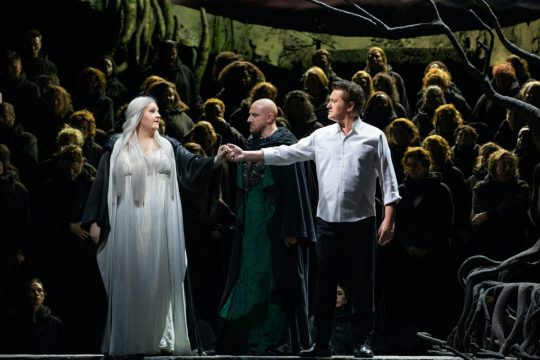
View On WordPress
#Alexa Jarvis#Andrea Coleman#Andrew Spriggs#Anne Nonnemacher#Anthony Clark Evans#Brian Mulligan#Catherine MiEun Choi-Steckmeyer#Chorus and Orchester Metropolitan Opera House#Christine Goerke#Errin Duane Brooks#Evgeny Nikitin#François Girard#Günther Groissböck#Lohengrin#Piotr Beczala#Richard Wagner#Stefan Egerstrom#Tamara Wilson#Thomas Capobianco#Yannick Nézet-Séguin
1 note
·
View note
Photo

Wagner Week @ the Met Opera
ICA—Not only can you access Met Opera on Demand from our Databases, you now can enjoy an opera each night from Met Opera’s special offerings.
Each day, a different encore presentation from the company’s Live in HD series is being made available for free streaming.
Here’s a guide for Wagner Week.
SCHEDULE for WEEK 2
Monday, March 23: Wagner’s Tristan und Isolde
Starring Nina Stemme, Ekaterina Gubanova, Stuart Skelton, Evgeny Nikitin, and René Pape, conducted by Simon Rattle. From October 8, 2016.
Tuesday, March 24: Wagner’s Das Rheingold
Starring Wendy Bryn Harmer, Stephanie Blythe, Richard Croft, Gerhard Siegel, Dwayne Croft, Bryn Terfel, Eric Owens, and Hans-Peter König, conducted by James Levine. From October 9, 2010.
Wednesday, March 25: Wagner’s Die Walküre
Starring Deborah Voigt, Eva-Maria Westbroek, Stephanie Blythe, Jonas Kaufmann, Bryn Terfel, and Hans-Peter König, conducted by James Levine. From May 14, 2011.
Thursday, March 26: Wagner’s Siegfried
Starring Deborah Voigt, Jay Hunter Morris, Gerhard Siegel, Bryn Terfel, and Eric Owens, conducted by Fabio Luisi. From November 5, 2011.
Friday, March 27: Wagner’s Götterdämmerung
Starring Deborah Voigt, Wendy Bryn Harmer, Waltraud Meier, Jay Hunter Morris, Iain Paterson, Eric Owens, and Hans-Peter König, conducted by Fabio Luisi. From February 11, 2012.
Saturday, March 28: Wagner’s Die Meistersinger von Nürnberg
Starring Annette Dasch, Johan Botha, Paul Appleby, and Michael Volle, conducted by James Levine. From December 13, 2014.
Sunday, March 29: Wagner’s Tannhäuser
Starring Eva-Maria Westbroek, Michelle DeYoung, Johan Botha, Peter Mattei, and Gunther Groissböck, conducted by James Levine. From October 31, 2015.
1 note
·
View note
Text
25 DE MARÇO DE 2023 : VINTE DIAS DEPOIS NA GULBENKIAN O LOHENGRIN TRANSMITIDO DO MET COM O CONSOLO DA COMPANHIA DO MANO MIGUEL QUE INCLUIU CONVITE PARA JANTAR . OCASIÃO PARA ESCAVAR AS MEMÓRIAS DE TRÊS GRANDES PRODUÇÕES QUE VIVI COM A MARIA ZAZA ….: neste regresso doloroso ontem Wagner fez-me enfrentar o ambiente das transmissões do MET na Gulbenkian . Fui consolado pela companhia do meu irmão Miguel . Ofereci-lhe espumante no intervalo e ele um convite para jantar no Gambrinus .!
O meu entusiasmo pela produção no Met pela primeira vez em dezassete anos, foi muito menor do que a da maioria destes fiéis assinantes das “óperas das amígdalas”
O director François Girard, já encenou Wagner duas vezes antes no Met: um belo "Parsifal" distópico, em 2013, e um "Holandês Voador" em 2020. Neste "Lohengrin" a estética pode ser descrita como "Fantasia Europeia da Netflix". Na sequência de um aparente desastre astronómico - a lua explode no clímax do prelúdio - as pessoas de Brabant são amontoadas numa espécie de cisterna gigante. A maioria está vestida com vestes vagamente medievais, com capas vermelhas e verdes. O desafio desta ópera é racionalizar a sua premissa sádica: Lohengrin defendeu a donzela Elsa com a condição de nunca perguntar quem ele é. Na ausência de uma direcção ambiciosa, o elenco teve alguma dificuldade em encontrar a sua base. A soprano Tamara Wilson, como Elsa, parece incerta nas suas primeiras cenas, embora à medida que a infelicidade da sua personagem se aprofundava, ela soltasse alguns tons de espaço, semelhantes aos de Isolda. Christina Goerke, como Ortrud,não me fascina . Günther Groissböck foi um forte mas monótono rei Heinrich, Evgeny Nikitin um Telramund com pouca potência . Yannick Nézet-Séguin ritmou a actuação de forma inteligente, mas deixou a orquestra brilhar demasiado alto. Mas tudo fica de lado face a interpretação estupenda do papel título por parte de Piotr Beczała.Mais uma vez, não importa. Esta encenação é essencial por causa da interpretação estupendamente segura do papel do título por parte de Piotr Beczała. Transcrevo aqui o que Alex Ross escreveu no New Yorker “ Once again, no matter. This staging is essential viewing on account of Piotr Beczała’s stupendously secure rendition of the title role. The star Polish tenor also appeared in Sharon’s “Lohengrin,” deploying his glorious voice to memorable dramatic effect; on this outing, the general theatrical vacuum seemed to free him to deliver a purely musical tour de force. Beauty of tone, precision of diction, crispness of attack, nobility of phrasing—nothing was lacking. The Grail Narrative, in Act III, gleamed like the object in question. Was it the words, the music, or the singer? Yes. ”

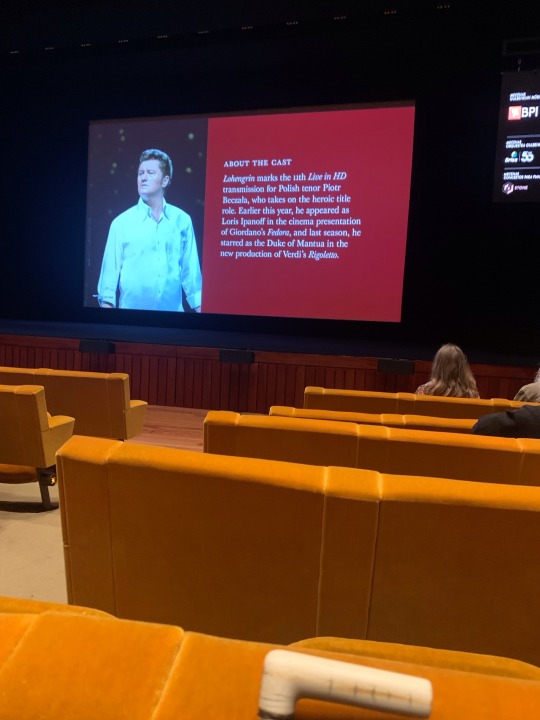


0 notes
Photo
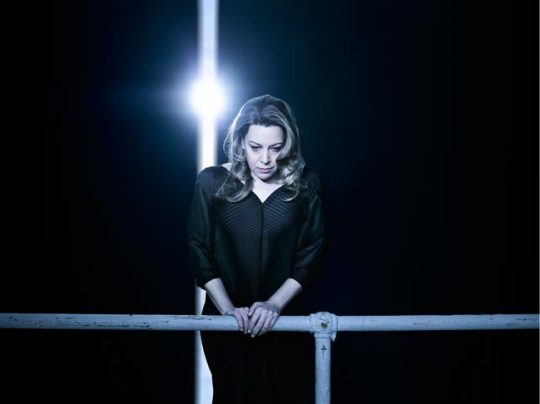
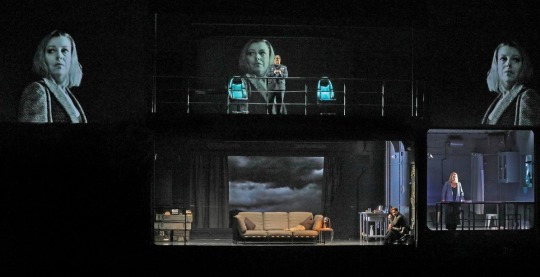

photos : Tristan und Isolde - Metopera 2016
Nightly Met Opera Streams
“During this extraordinary and difficult time, the Met hopes to brighten the lives of our audience members even while our stage is dark. Each day, a different encore presentation from the company’s Live in HD series is being made available for free streaming on the Met website, with each performance available for a period of 23 hours, from 7:30 p.m. EDT until 6:30 p.m. the following day. The schedule will include outstanding complete performances from the past 14 years of cinema transmissions, starring all of opera’s greatest singers”.
on the homepage of metopera.org : performance will be available for 20 hours once posted, free of charge. until 6:30
Monday, March 23
Wagner’s Tristan und Isolde
Starring Nina Stemme, Ekaterina Gubanova, Stuart Skelton, Evgeny Nikitin, and René Pape, conducted by Simon Rattle. From October 8, 2016. [review]
Tuesday, March 24
Wagner’s Das Rheingold
Starring Wendy Bryn Harmer, Stephanie Blythe, Richard Croft, Gerhard Siegel, Dwayne Croft, Bryn Terfel, Eric Owens, and Hans-Peter König, conducted by James Levine. From October 9, 2010.[review]
Wednesday, March 25
Wagner’s Die Walküre
Starring Deborah Voigt, Eva-Maria Westbroek, Stephanie Blythe, Jonas Kaufmann, Bryn Terfel, and Hans-Peter König, conducted by James Levine. From May 14, 2011.
Thursday, March 26
Wagner’s Siegfried
Starring Deborah Voigt, Jay Hunter Morris, Gerhard Siegel, Bryn Terfel, and Eric Owens, conducted by Fabio Luisi. From November 5, 2011.
Friday, March 27
Wagner’s Götterdämmerung
Starring Deborah Voigt, Wendy Bryn Harmer, Waltraud Meier, Jay Hunter Morris, Iain Paterson, Eric Owens, and Hans-Peter König, conducted by Fabio Luisi. From February 11, 2012.
Saturday, March 28
Wagner’s Die Meistersinger von Nürnberg
Starring Annette Dasch, Johan Botha, Paul Appleby, and Michael Volle, conducted by James Levine. From December 13, 2014.
Sunday, March 29
Wagner’s Tannhäuser
Starring Eva-Maria Westbroek, Michelle DeYoung, Johan Botha, Peter Mattei, and Gunther Groissböck, conducted by James Levine. From October 31, 2015.
1 note
·
View note
Text
A New Production of Wagner’s Der Fliegende Holländer Opens Tonight Directed by François Girard and Conducted by Valery Gergiev
A New Production of Wagner’s Der Fliegende Holländer Opens Tonight Directed by François Girard and Conducted by Valery Gergiev
Evgeny Nikitin stars in the title role and Anja Kampe makes a notable Met debut as Senta
François Girard returns to the Met for the first time since his acclaimed production of Wagner’s Parsifal
Der Fliegende Holländer will be transmitted live to movie theaters around the world on Saturday, March 14, as part of The Met: Live in HD series
A co-production of the Metropolitan Opera; Dutch National…
View On WordPress
#Alok Kumar#Anja Kampe#Carolyn Choa#David Finn#David Portillo#Dutch National Opera#Evgeny Nikitin#François Girard#Franz-Josef Selig#John Macfarlane#Metropolitan Opera#Mihoko Fujimura#Opéra de Québec#Peter Flaherty#Serge Lamothe.#Sergey Skorokhodov#The Abu Dhabi Festival#Valery Gergiev#Wagner’s Der Fliegende Holländer
0 notes
Video
vimeo
BALMAIN | WILD from CAT WITH KNIFE on Vimeo.
Spec commercial
Featuring | Alina Larina, Ekaterina Lushnikova, Julia Smal', Nyasha Rumbidzai Hokoma, Anna Vasilieva
Director | Cat with Knife
Executive Producer | Victoria Makarova
Producer Assistant | Lena Golikova
Stylist | Anastasia Batalova
Stylist Assistant | Maria Shentalinskaya
Hair and Make-up Artist | Margarita Yavorskaya, Anna Yelanskaya, Alexandra Barkalina
Camera B Operator | Egor Chechkin
1AC | Denis Shaiakhov, Igor Halilyulin
2AC | Alexey Lazovsky
Music | Yan Pavelchuk
Color Correction | Evgeny Gvozdev
Clean-up | Roman Starostin
Special Thanks | Second Friend Store, Olga Zaitseva, Anton Gromov, KIRILLIN Camera Rental, Sergey Pavlov, Alexey Salnikov, Yuri Halturin, Alexey Vazhov, Vsevolod Girnik, Illarion Ershov, Semen Ivanov, Irina Zlobina, Demir Kuular, Igor Shichkov, Evgeny Nikitin, Anastasia Trushina, Sonya Pankevich
1 note
·
View note
Text
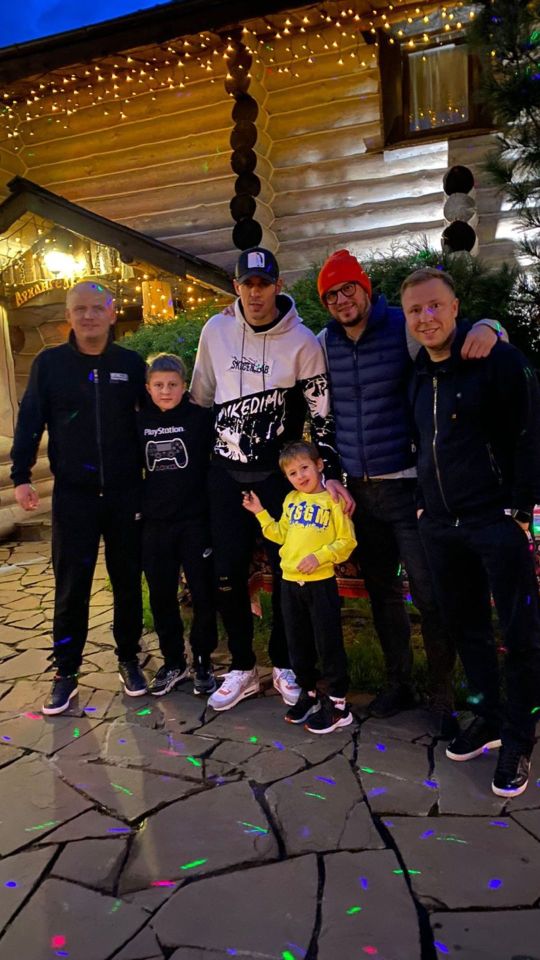
X
#evgeni malkin#nikita malkin#summer 2021#moscow#anatoly oder#alexey ubeyvolk#filipp nikitin#matvei nikitin
13 notes
·
View notes
Video
Spec commercial Featuring | Alina Larina, Ekaterina Lushnikova, Julia Smal', Nyasha Rumbidzai Hokoma, Anna Vasilieva Director | Cat with Knife Executive Producer | Victoria Makarova Producer Assistant | Lena Golikova Stylist | Anastasia Batalova Stylist Assistant | Maria Shentalinskaya Hair and Make-up Artist | Margarita Yavorskaya, Anna Yelanskaya, Alexandra Barkalina Camera B Operator | Egor Chechkin 1AC | Denis Shaiakhov, Igor Halilyulin 2AC | Alexey Lazovsky Music | Yan Pavelchuk Color Correction | Evgeny Gvozdev Clean-up | Roman Starostin Special Thanks | Second Friend Store, Olga Zaitseva, Anton Gromov, KIRILLIN Camera Rental, Sergey Pavlov, Alexey Salnikov, Yuri Halturin, Alexey Vazhov, Vsevolod Girnik, Illarion Ershov, Semen Ivanov, Irina Zlobina, Demir Kuular, Igor Shichkov, Evgeny Nikitin, Anastasia Trushina, Sonya Pankevich
1 note
·
View note